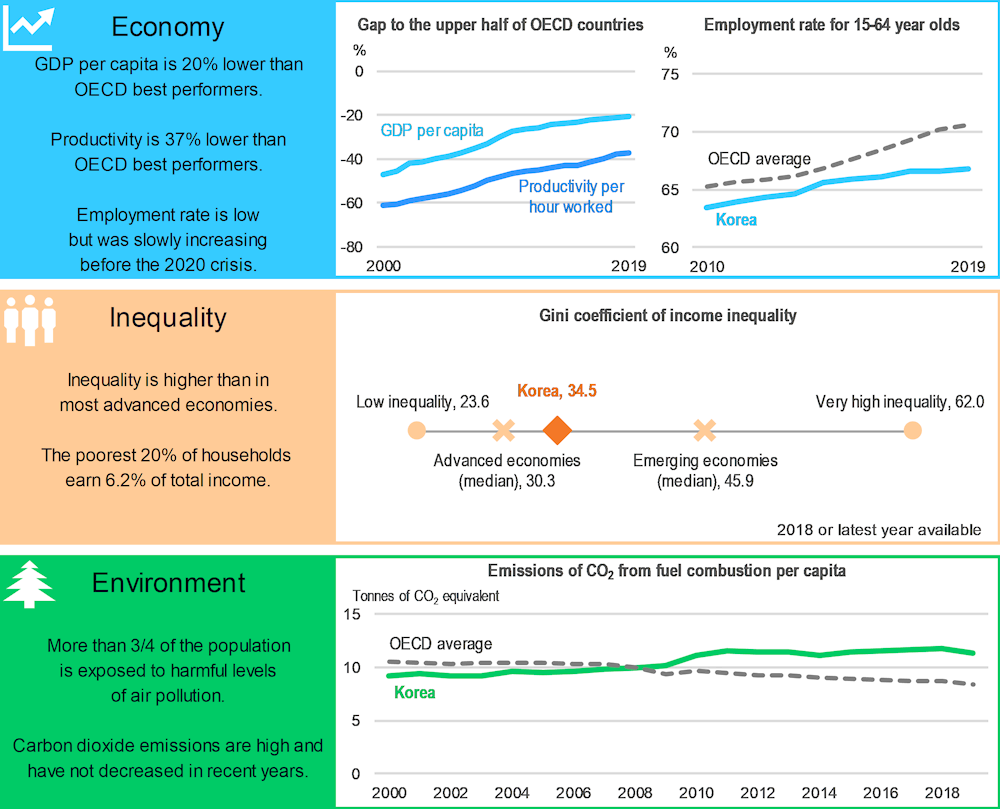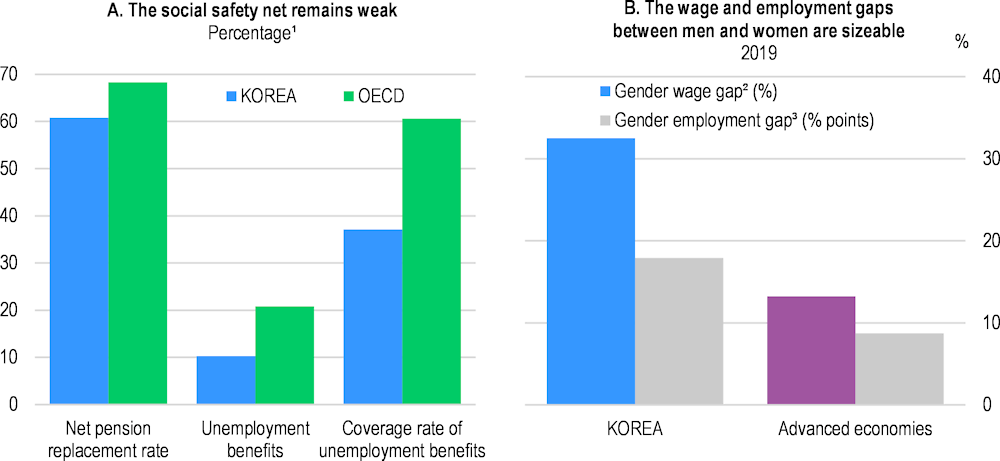The pandemic highlighted vulnerabilities of the dual labour market and a weak social safety net. A welfare reform needs to be coupled with policies aimed at increasing employment and job quality, especially for women and older workers, who are often in non-regular jobs and the most affected by the crisis. A more flexible labour market would allow workers to move more easily from crisis-hit sectors to growing industries.
Economic Policy Reforms 2021

Korea
Korea: Performance prior to the COVID-19 crisis

Economy: Percentage gap with respect to the population-weighted average of the highest 18 OECD countries in terms of GDP per capita (in constant 2015 PPPs).
Inequality: The Gini coefficient for disposable income measures the extent to which the distribution of disposable income among households deviates from perfect equal distribution. A value of zero represents perfect equality and a value of 100 extreme inequality.
Environment: A high exposure to air pollution refers to above 10 μg/m3 of PM2.5.
Source: Economy: OECD, National Accounts, Productivity and Labour Force Statistics Databases; Inequality: OECD, Income Distribution Database and World Bank, World Development Indicators Database; Environment: OECD, Environment and Energy Databases.
Improving social safety net and labour market regulations to increase resilience
The social safety net needs strengthening, especially for non-regular workers. Unemployment benefits are relatively low and the coverage of non-regular workers remains insufficient, despite recent expansions (Panel A). Inadequate pensions force many older Koreans to work until an advanced age, often with a non-regular job contract. In the pandemic this exposed them to high health and economic risks. Old-age benefits should be better targeted towards the elderly with the lowest incomes to alleviate poverty. Compliance with social insurance should also be reinforced through more effective enforcement. With fast population ageing in the pipeline, financing the welfare system will require more resources. As the recovery takes hold, the structure of taxation should gradually shift towards more growth-friendly instruments, like VAT and environment-related taxes.
Korea: Vulnerabilities and areas for reform

1. The net pension replacement rate (2018) refers to male workers at 50% of the average wage. Unemployment benefits (2019 data or latest year available for the OECD average and 2018 for Korea) are measured as average gross replacement rates across three family types at various previous earnings and unemployment durations. The coverage rate of unemployment benefits (2016, both insurance and assistance) is measured in percent of the unemployed.
2. 2019 or latest year available. The gender wage gap is unadjusted and is defined as the difference between median earnings of men and women relative to median earnings of men. Data refer to full-time employees and to self-employed.
3. Gender employment gap for working-age population.
Source: Panel A: OECD, Pensions at a Glance, Social Expenditure (SOCX) and Tax-Benefit Databases; Panel B: OECD, Gender and Labour Force Statistics Databases.
Reducing labour market duality would improve resilience of the economy further. This can be done by relaxing employment protection for regular workers. In particular, simplifying and accelerating the remedial procedures for unfair dismissal and making them more transparent should be considered. Such reforms entail potential trade-offs, at least in the short term, and should be therefore sequenced in line with improving economic and labour market situation. Policies to support employment of women and older persons should be further strengthened, all the more as both of these groups are disproportionately affected by the COVID-19 crisis and women have lower employment and salaries than men (Panel B).
To capitalise on the national development strategy for the recovery, the Korean New Deal, product market regulations need to adapt to the rapid evolution of technology. Reducing administrative guidance and phasing out entry barriers for large firms in business lines reserved for SMEs would also boost competition and productivity, particularly in services. A vast array of environmental investments in the New Deal recovery package should be complemented by stronger environmental regulations and price signals (pricing CO2 emissions evenly across sectors and fuels, and raising prices according to a predictable schedule) to facilitate the green transition.
Korea: Summary of Going for Growth priorities and recommendations
|
2019-2020 Reforms |
Recommendations |
|---|---|
|
Social protection: Strengthen the social safety net and improve the efficiency of the tax system |
|
|
☑ Employees working less than 15 hours per week became eligible to Employment Insurance benefits in 2019. ☑ The range of non-standard contract employees eligible to the Industrial Accident Compensation Insurance was extended in 2020. ☑ The government raised the Employment Retention Subsidy and eased eligibility conditions in 2020. ☑ The monthly Basic Pension benefit for the bottom 20% of the elderly was raised to up to KRW 300 000 in 2019. |
□ Strengthen protection and coverage for non-regular workers and workers in new forms of employment (e.g. platform workers) and increase compliance with social insurance through more effective enforcement. □ Gradually raise government revenue to finance rising social spending, focusing on taxes with a less negative impact on growth, such as the VAT and environment-related taxes. □ Focus the Basic Pension on the elderly with the lowest incomes and expand the coverage of the National Pension Scheme. |
|
Labour market: Reform employment protection legislation |
|
|
No action taken. |
□ Relax employment protection for regular workers, in particular by simplifying and accelerating the remedial procedures for unfair dismissal and making them more transparent. |
|
Labour market: Strengthen policies to support employment of women and older persons |
|
|
☑ The government has established new public childcare centres and extended the accreditation system with mandatory assessment to all childcare centres since 2019. ☑ Family care leave up to 20 days per year was introduced in 2020 to improve work-life balance. ☑ A salary comparison website, showing salary brackets of private sector employees based on firm size, gender, business types, etc., was launched in 2020. |
□ Raise resources for the public employment service and training programmes to maintain effective support for jobseekers. □ Regularly publish a national-level analysis of wage difference determinants to promote fairer wages across genders. □ Expand incentives for workers and employers to ensure that workers stay longer in their career jobs, including through more flexibility in wages, with the view to raising the minimum mandatory retirement age further over time. |
|
Competition and regulation: Reduce the regulatory burden on economic activity |
|
|
☑ The government introduced regulatory sandboxes in January 2019 for businesses in new technologies and industries. 404 projects had been approved by December 2020. ☑ Regulation-free special zones were introduced in 2019. 21 zones had been designated by October 2020. ☑ A programme to shift the burden of proof from the regulated to the regulator was introduced in 2019, and its scope was extended in 2020. ☑ Regulations on remote services, such as telework, online classes, and telemedicine were eased temporarily or permanently. |
□ Use regulatory sandboxes to identify excessive regulation and revise or abolish it. □ Facilitate telemedicine while considering patient safety and quality of care. □ Reduce the role of administrative guidance. □ Phase out entry barriers for large firms in business lines reserved for SMEs. |
|
*Environmental policy: Strengthen environmental regulations and price signals* |
|
|
*New priority * |
□ Tighten caps for air pollutant emissions and strengthen vehicle emission standards. □ Price CO2 emissions evenly across sectors and fuels and raise pricing according to a predictable schedule. |
Recent progress on structural reforms
The response to the COVID-19 crisis has added momentum to the strengthening of the social safety net. The conversion of some temporary measures, such as the introduction of sickness benefits, into permanent arrangements is being considered. The acceleration of digitalisation boosted regulatory experiments through sandboxes, which have yet to be converted into permanent regulatory reforms. The Korean New Deal, introduced in response to the crisis and running through 2025, includes digital and green investments, as well as measures to strengthen the social safety net. Successful implementation would foster inclusive and green growth.